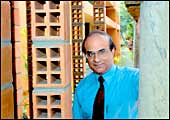|
|
"The attempt,
while writing case studies (which are prepared in-house),
is to make them as real as possible"
Jagjit Singh, Head (Human Resource), Ernst
& Young |
| Help, Tarun! |
| Brick By Brick |
This
is just another indication of the extent to which India Inc. has
professionalised its act. Time was, not so long ago, when job
interviews meant answering a few general questions about oneself
and carefully navigating one's way around a few trick questions-designed
to test a candidate's wits and presence of mind. A few good answers,
a bit of luck, a well-written resume and, in many cases, a good
recommendation, were all it took to land a good job. All of these
still play important roles in the executive search process, but
only up to a point. A candidate's suitability and aptitude for
the job at hand-easily the most important parameter that the above
criteria did not even begin to address-are now increasingly becoming
the most important, even decisive, factors.
For senior positions, especially, interviews
are structured to test a candidate's leadership qualities, the
ability to handle teams and conflict resolution skills. Many companies
tweak their own internal transactions and present them to candidates
for analysis. "Case studies are prepared in-house with the
help of team members who have lived the experience. The attempt,
while writing case studies, is to make them as real as possible,
with the objective of bringing out in the discussion or presentation
traits, behaviours and information which indicate the presence
or absence of a defined competency set," says Jagjit Singh,
Head (Human Resource), Ernst & Young.
THIS IS HOW INTERVIEWS
ARE CONDUCTED |
CASE STUDY AT ERNST & YOUNG
Real life examples from its Transaction Advisory Services
department are presented to applicants who apply for positions
in that division. Only the client's name, transaction figures
and context of the transaction are changed to protect client
confidentiality. The candidate has to write a case study based
on this information at the interview.
CASE STUDY AT BLOOMBERG
Candidates are presented with a press release on a company's
financial results, stock price and comments from the management.
They are also asked to familiarise themselves with the Bloomberg
stylebook. They then have to write a short three to four
paragraph news item for Bloomberg subscribers conforming
to its style parameters.
CASE STUDY AT TECH MAHINDRA
A candidate was asked to consider the deregulation of
the telecom industry in UK and asked how he would handle
it from the marketing, strategy and technical points of
view if he were in a decision-making position at British
Telecom.
Companies also routinely use other assessment
techniques like psychometric tests, SHL tools and Thomas
profiling
|
In January this year, Debashish Ganguly, an
engineer-MBA, who had applied for the position of General Manager
(Corporate Resource Coordination Committee) in Satyam Computer
Services' hr department, had to undergo a similar test. He was
asked to solve the riddle of how to utilise Satyam's 30,000 employees
optimally such that benching was minimised while simultaneously
ensuring that staffing was in place when business opportunities
emerged. "The model involved combining resource optimisation
and market growth prediction tools," says Ganguly.
The selection process involved five levels
of interviews and two levels of assessment-including psychometric
and IQ tests and a series of exercises to assess one's ability
to take on stress. "What I found unique was the round we
had after the selection," says Ganguly. He and some other
new recruits were divided into teams and each member had to go
beyond his or her domain and make a pitch for the company (Satyam)
to a potential client. "We had to sell a sap solution to
a major retail client in the us. This meant we needed to have
a cross-functional grasp of the subject," he says. Ganguly's
domain is corporate strategy, but he needed to quickly grasp the
technology aspect of the business, get a clear understanding of
Satyam's sap capability and form an idea of how it could help
the client solve its problem. The simulated exercise was treated
as a real boardroom presentation; a senior team from Satyam "played"
the client and everyone had to dress formally for the occasion.
The entire selection process was spread over a month. Ganguly,
who got the job, has since moved up the ladder and is now an Assistant
Vice President in the same department.
|
|
"All these parameters
are doubtless very important, but situational tests are what
we use to make the final selection page"
Anand Talwar, Head (HR), ITC Infotech |
 |
"We had to sell a
SAP solution to a major retail client in the US. This meant
we needed to have a cross-functional grasp of the subject"
Debashish Ganguly, Assistant Vice President,
Satyam Computer Services (L), with Hari T., Director and Senior
VP (HR), Satyam Computer Services |
Says Mohan Bharati, Deputy General Manager
(Treasury) and Company Secretary, Ingram Micro, who recently joined
the technology solutions vendor from Federal Express: "At
the interview, I was asked to describe an incident where an unanticipated
event had disrupted the workflow and explain how I handled it."
In effect, he was being asked to describe a live case study and
analyse it. He narrated an incident where he had sorted out an
unforeseen procedural problem that threatened a new flight his
previous employer was planning into India. "When I put this
question to Mohan, I was looking at his competence and motivational
fit. We have to work under tight deadlines and pressures. His
answer satisfied me that he would fit in culturally into our organisation,"
says Alex Augustine, Director (HR), Ingram Micro.
"Situational case studies help us understand
how a person thinks and reacts in an ambiguous situation (as most
real life situations are wont to be)," says Sujit Baksi,
President (Corporate Affairs), Tech Mahindra, who looks for both
quantitative and cognitive abilities in candidates. "For
example, when we are looking for someone with great persuasive
ability, we throw a live situation-based question and ask the
candidate to react to that; this is more effective than simply
asking how persuasive he/she is," says Augustine. The weightages
allotted to each function also vary from case to case. "There
could be cases where a particular candidate is not so good at
analysing a case study but is very good at execution. So, the
interviewer takes a call on the weightage," explains Hari
T., Director and Senior VP (HR), Satyam Computer Services. The
idea, says E&Y's Singh, is to test a candidate's ability to
lead and handle teams, plan and organise projects and resolve
conflicts-all very crucial functions for any senior executive.
|
|
"Situational case
studies help us understand how a person thinks and reacts
in an ambiguous situation"
Sujit Baksi, President (Corporate Affairs),
Tech Mahindra |
But, this is not to say that the traditional
parameters are not considered at all. It's just that issues like
past experience, qualifications and references are now used in
the initial stages of screening; these are taken as givens in
the case of candidates shortlisted for the next stage of the selection
process. "All these parameters are doubtless very important,
but situational tests are what we use to make the final selection,"
says Anand Talwar, Head (HR), ITC Infotech. He, however, declines
to share live examples of actual tests that candidates at his
company have had to undergo. Where do companies source their case
studies? Says T. Sreedhar, Managing Director, TMI Network, a head
hunting firm: "Most companies have their own learning and
training centres, and, so, are able to generate case studies in-house."
"Today, we are moving away from one-on-one
interviews and increasingly focussing on the competency model,"
says Arun Das Mahapatra, Managing Partner (India), Heidrick &
Struggles, a recruitment firm, adding that 30-40 per cent of large
recruiters now use such Criterion Based Interviewing (CBI) techniques
to fill up senior-level vacancies.
So, the next time you go for a job interview,
you should be prepared for a long haul and also expect the unexpected.
-additional reporting by
Shaleen Agrawal & Ritwik Mukherjee
COUNSELLING
Help, Tarun!
 Q: I am a 23-year-old commerce graduate with an MBA (HR), working
as a recruitment and training executive in a private insurance
firm for two years. My true interest lies in HR and I always wanted
to shift to development and training in the domain of Six Sigma.
Please advise.
Q: I am a 23-year-old commerce graduate with an MBA (HR), working
as a recruitment and training executive in a private insurance
firm for two years. My true interest lies in HR and I always wanted
to shift to development and training in the domain of Six Sigma.
Please advise.
Since you already have an MBA, look for a job (either within your
company or outside) that has a management development angle to
it. But with your limited experience, you will have to start at
the entry level. Also while Six Sigma is great, you need to figure
out whether in the long term you want to be a specialist in it
or a generalist. Select your future employer and career path carefully
to meet this ambition.
Q: I am a 23-year-old working in a bank.
I've done MCom and am currently pursuing a part-time MBA. I'm
quite unhappy with my present job as it doesn't pay well. Now,
I want to switch to marketing. I live in a small town where there
aren't very many educational institutes. Please help.
You could get into sales of financial services.
Unless yours is a very small town, you will have firms selling
insurance, loans, etc. Or apply for jobs in towns with better
prospects. A part-time MBA from a little-known institute will
not catapult you into something big overnight. You will have to
work your way through it.
Answers to your career concerns are contributed
by Tarun Sheth (Senior Consultant) and Shilpa Sheth (Managing
Partner, US practice) of HR firm, Shilputsi Consultants. Write
to Help,Tarun! c/o Business Today, Videocon Tower, Fifth Floor,
E-1, Jhandewalan Extn., New Delhi-110055..
Brick
By Brick
There are thousands of good jobs being created
in the real estate sector.
The
continuing real estate boom, and the increasing corporatisation
of the sector, has thrown up huge job opportunities for professionals.
Today, multi-hundred crore and even thousand-crore projects are
pretty much par for the course. Naturally, the industry is increasingly
turning to specialist professionals to plan and manage these projects.
In demand are architects, civil engineers, site supervisors, quality
supervisors, interior designers, project managers and even environment
engineers. This apart, the emergence of a buyer's market means
promoters need savvy marketing personnel to sell their projects.
"The need for specialised manpower is unavoidable and they account
for nearly 10 per cent of the total cost of a project," says Surya
Vir Singh, Assistant Chief General Manager, Sahara Infrastructure
& Housing.
-Amit Mukherjee
| The Big Picture |
| WHO'S HIRING: Reliance, DLF, Unitech,
Puravankara, Parsvanath, among others
WHO ARE THEY HIRING: Architects, mall and township
management professionals, project engineers, civil engineers,
lawyers, quality assurance professionals, marketing professionals,
liaison and communications professionals, etc.
AT WHAT LEVELS: Senior, mid-level and entry-level
AT WHAT SALARIES: Rs 25 lakh-1 crore per annum
at senior levels; Rs 10-20 lakh p.a. at mid-levels; and
Rs 2-8 lakh at entry-to-junior levels
|
|









 Q: I am a 23-year-old commerce graduate with an MBA (HR), working
as a recruitment and training executive in a private insurance
firm for two years. My true interest lies in HR and I always wanted
to shift to development and training in the domain of Six Sigma.
Please advise.
Q: I am a 23-year-old commerce graduate with an MBA (HR), working
as a recruitment and training executive in a private insurance
firm for two years. My true interest lies in HR and I always wanted
to shift to development and training in the domain of Six Sigma.
Please advise.